Report: Analysis of Leadership Styles for a Developing Manager
VerifiedAdded on 2020/01/28
|28
|4160
|52
Report
AI Summary
This report delves into the principles and practices of management, focusing on the development of a prospective manager within the hospitality industry, using Thomas Cook as a case study. It begins by comparing different management styles, specifically contrasting the participative approach of Thomas Cook with the autocratic style of TUI Group, highlighting their strengths and weaknesses. The report then discusses leadership characteristics, examining both participative and autocratic leadership styles. Further, it explores the importance of effective communication within organizations, outlining formal and informal communication channels. The analysis extends to organizational culture, differentiating between power and role cultures. Finally, the report includes self-assessment of managerial skills and discusses leadership and motivation styles to achieve desired goals and objectives. The report also incorporates a self-assessment of the author's skills and discusses leadership and motivation styles for achieving goals.
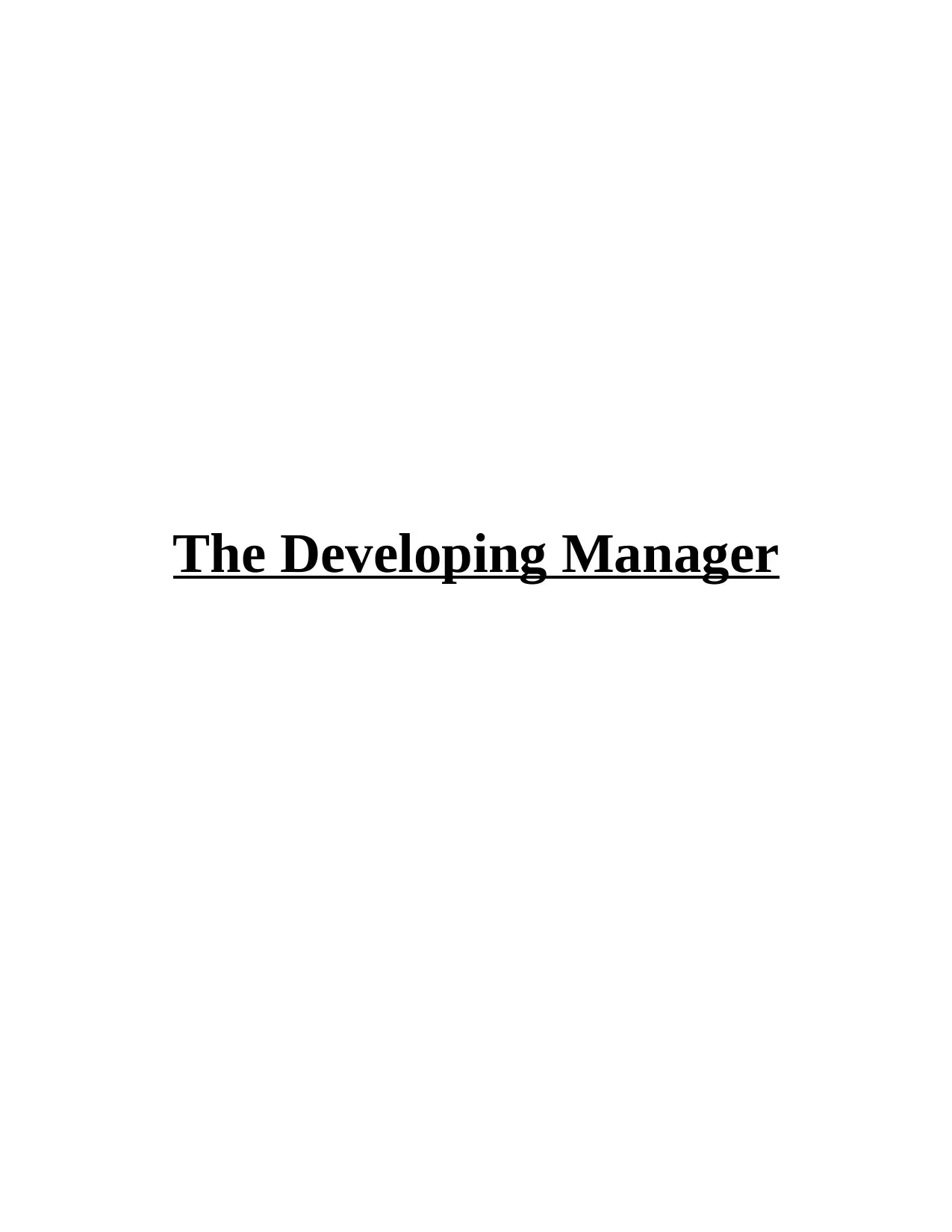
The Developing Manager
Paraphrase This Document
Need a fresh take? Get an instant paraphrase of this document with our AI Paraphraser
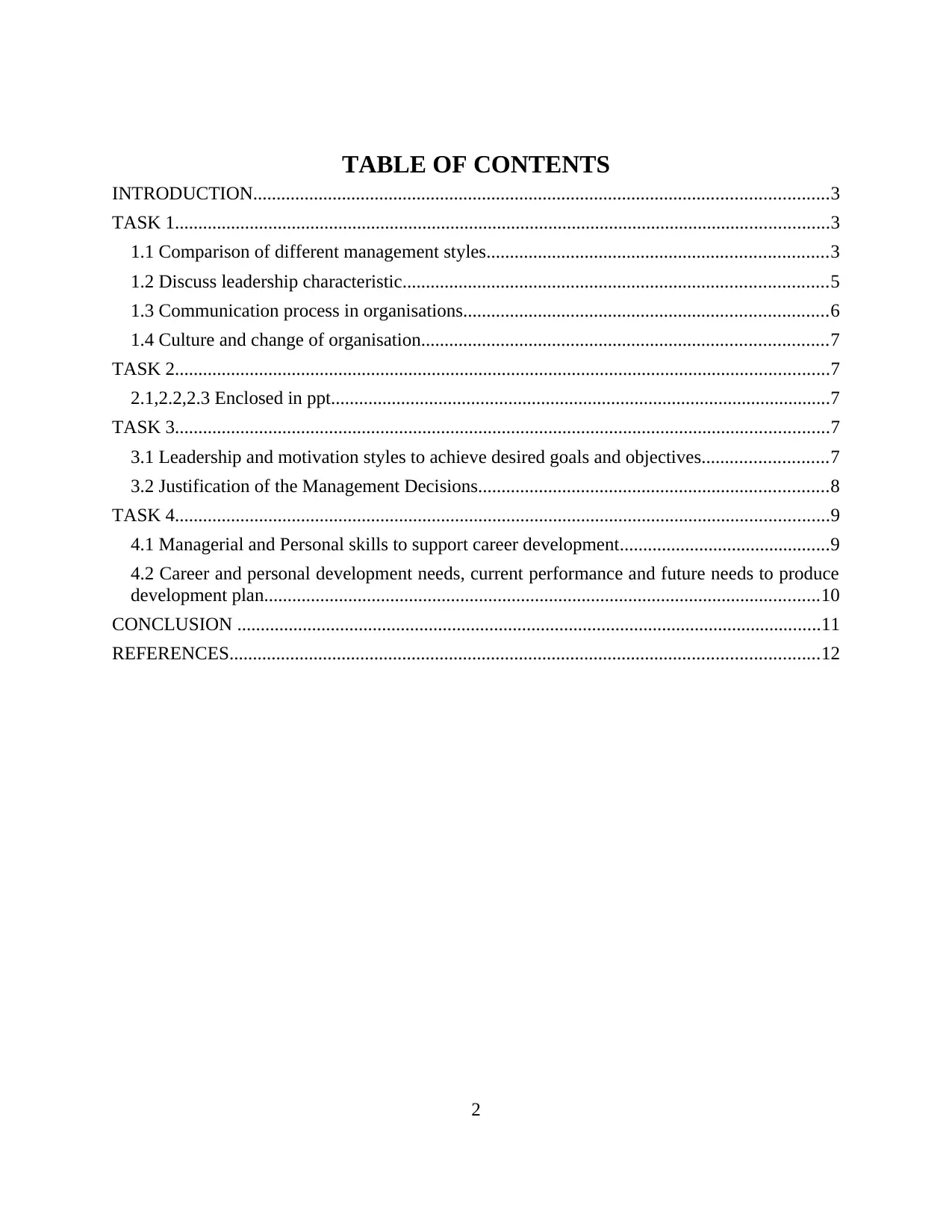
TABLE OF CONTENTS
INTRODUCTION...........................................................................................................................3
TASK 1............................................................................................................................................3
1.1 Comparison of different management styles.........................................................................3
1.2 Discuss leadership characteristic...........................................................................................5
1.3 Communication process in organisations..............................................................................6
1.4 Culture and change of organisation.......................................................................................7
TASK 2............................................................................................................................................7
2.1,2.2,2.3 Enclosed in ppt...........................................................................................................7
TASK 3............................................................................................................................................7
3.1 Leadership and motivation styles to achieve desired goals and objectives...........................7
3.2 Justification of the Management Decisions...........................................................................8
TASK 4............................................................................................................................................9
4.1 Managerial and Personal skills to support career development.............................................9
4.2 Career and personal development needs, current performance and future needs to produce
development plan.......................................................................................................................10
CONCLUSION .............................................................................................................................11
REFERENCES..............................................................................................................................12
2
INTRODUCTION...........................................................................................................................3
TASK 1............................................................................................................................................3
1.1 Comparison of different management styles.........................................................................3
1.2 Discuss leadership characteristic...........................................................................................5
1.3 Communication process in organisations..............................................................................6
1.4 Culture and change of organisation.......................................................................................7
TASK 2............................................................................................................................................7
2.1,2.2,2.3 Enclosed in ppt...........................................................................................................7
TASK 3............................................................................................................................................7
3.1 Leadership and motivation styles to achieve desired goals and objectives...........................7
3.2 Justification of the Management Decisions...........................................................................8
TASK 4............................................................................................................................................9
4.1 Managerial and Personal skills to support career development.............................................9
4.2 Career and personal development needs, current performance and future needs to produce
development plan.......................................................................................................................10
CONCLUSION .............................................................................................................................11
REFERENCES..............................................................................................................................12
2
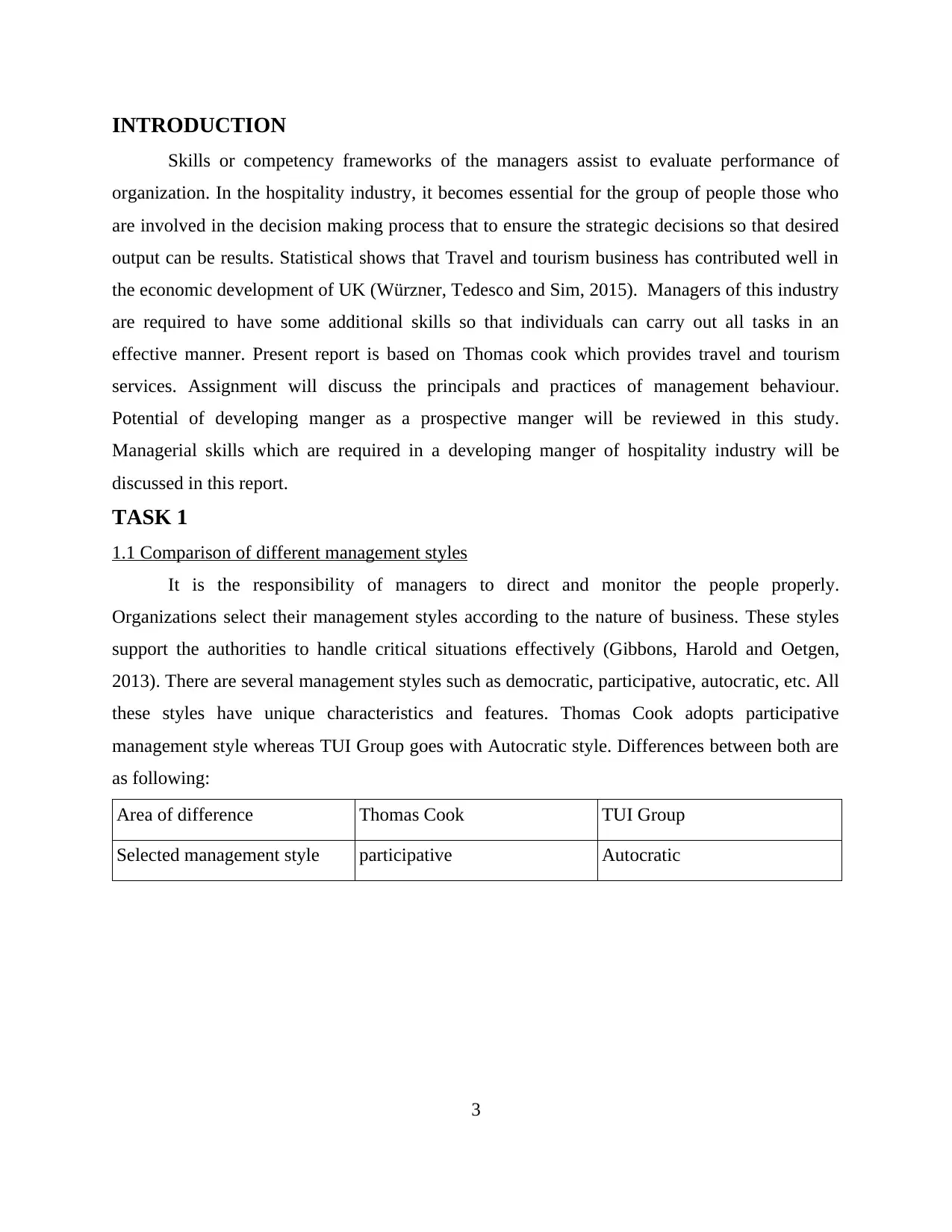
INTRODUCTION
Skills or competency frameworks of the managers assist to evaluate performance of
organization. In the hospitality industry, it becomes essential for the group of people those who
are involved in the decision making process that to ensure the strategic decisions so that desired
output can be results. Statistical shows that Travel and tourism business has contributed well in
the economic development of UK (Würzner, Tedesco and Sim, 2015). Managers of this industry
are required to have some additional skills so that individuals can carry out all tasks in an
effective manner. Present report is based on Thomas cook which provides travel and tourism
services. Assignment will discuss the principals and practices of management behaviour.
Potential of developing manger as a prospective manger will be reviewed in this study.
Managerial skills which are required in a developing manger of hospitality industry will be
discussed in this report.
TASK 1
1.1 Comparison of different management styles
It is the responsibility of managers to direct and monitor the people properly.
Organizations select their management styles according to the nature of business. These styles
support the authorities to handle critical situations effectively (Gibbons, Harold and Oetgen,
2013). There are several management styles such as democratic, participative, autocratic, etc. All
these styles have unique characteristics and features. Thomas Cook adopts participative
management style whereas TUI Group goes with Autocratic style. Differences between both are
as following:
Area of difference Thomas Cook TUI Group
Selected management style participative Autocratic
3
Skills or competency frameworks of the managers assist to evaluate performance of
organization. In the hospitality industry, it becomes essential for the group of people those who
are involved in the decision making process that to ensure the strategic decisions so that desired
output can be results. Statistical shows that Travel and tourism business has contributed well in
the economic development of UK (Würzner, Tedesco and Sim, 2015). Managers of this industry
are required to have some additional skills so that individuals can carry out all tasks in an
effective manner. Present report is based on Thomas cook which provides travel and tourism
services. Assignment will discuss the principals and practices of management behaviour.
Potential of developing manger as a prospective manger will be reviewed in this study.
Managerial skills which are required in a developing manger of hospitality industry will be
discussed in this report.
TASK 1
1.1 Comparison of different management styles
It is the responsibility of managers to direct and monitor the people properly.
Organizations select their management styles according to the nature of business. These styles
support the authorities to handle critical situations effectively (Gibbons, Harold and Oetgen,
2013). There are several management styles such as democratic, participative, autocratic, etc. All
these styles have unique characteristics and features. Thomas Cook adopts participative
management style whereas TUI Group goes with Autocratic style. Differences between both are
as following:
Area of difference Thomas Cook TUI Group
Selected management style participative Autocratic
3
⊘ This is a preview!⊘
Do you want full access?
Subscribe today to unlock all pages.

Trusted by 1+ million students worldwide
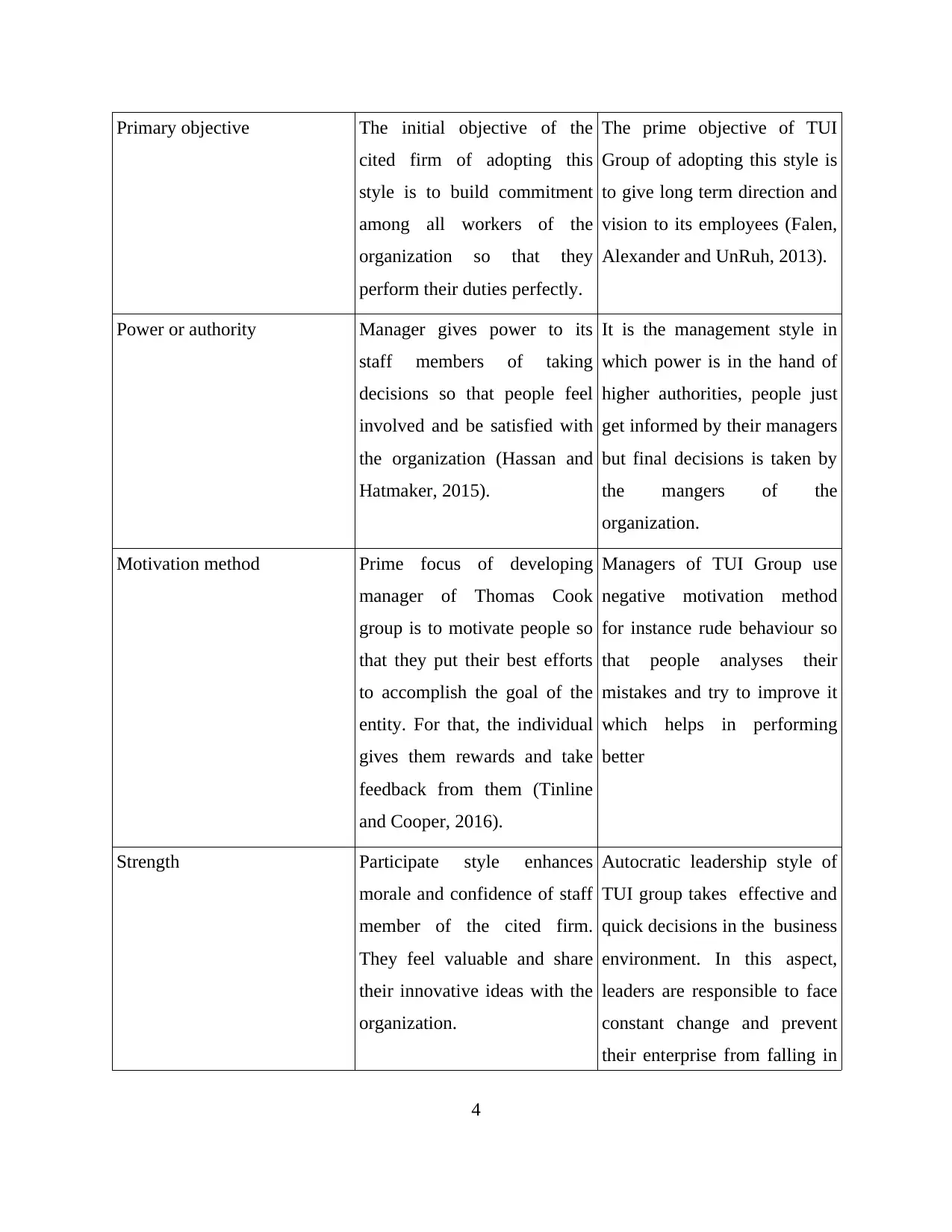
Primary objective The initial objective of the
cited firm of adopting this
style is to build commitment
among all workers of the
organization so that they
perform their duties perfectly.
The prime objective of TUI
Group of adopting this style is
to give long term direction and
vision to its employees (Falen,
Alexander and UnRuh, 2013).
Power or authority Manager gives power to its
staff members of taking
decisions so that people feel
involved and be satisfied with
the organization (Hassan and
Hatmaker, 2015).
It is the management style in
which power is in the hand of
higher authorities, people just
get informed by their managers
but final decisions is taken by
the mangers of the
organization.
Motivation method Prime focus of developing
manager of Thomas Cook
group is to motivate people so
that they put their best efforts
to accomplish the goal of the
entity. For that, the individual
gives them rewards and take
feedback from them (Tinline
and Cooper, 2016).
Managers of TUI Group use
negative motivation method
for instance rude behaviour so
that people analyses their
mistakes and try to improve it
which helps in performing
better
Strength Participate style enhances
morale and confidence of staff
member of the cited firm.
They feel valuable and share
their innovative ideas with the
organization.
Autocratic leadership style of
TUI group takes effective and
quick decisions in the business
environment. In this aspect,
leaders are responsible to face
constant change and prevent
their enterprise from falling in
4
cited firm of adopting this
style is to build commitment
among all workers of the
organization so that they
perform their duties perfectly.
The prime objective of TUI
Group of adopting this style is
to give long term direction and
vision to its employees (Falen,
Alexander and UnRuh, 2013).
Power or authority Manager gives power to its
staff members of taking
decisions so that people feel
involved and be satisfied with
the organization (Hassan and
Hatmaker, 2015).
It is the management style in
which power is in the hand of
higher authorities, people just
get informed by their managers
but final decisions is taken by
the mangers of the
organization.
Motivation method Prime focus of developing
manager of Thomas Cook
group is to motivate people so
that they put their best efforts
to accomplish the goal of the
entity. For that, the individual
gives them rewards and take
feedback from them (Tinline
and Cooper, 2016).
Managers of TUI Group use
negative motivation method
for instance rude behaviour so
that people analyses their
mistakes and try to improve it
which helps in performing
better
Strength Participate style enhances
morale and confidence of staff
member of the cited firm.
They feel valuable and share
their innovative ideas with the
organization.
Autocratic leadership style of
TUI group takes effective and
quick decisions in the business
environment. In this aspect,
leaders are responsible to face
constant change and prevent
their enterprise from falling in
4
Paraphrase This Document
Need a fresh take? Get an instant paraphrase of this document with our AI Paraphraser
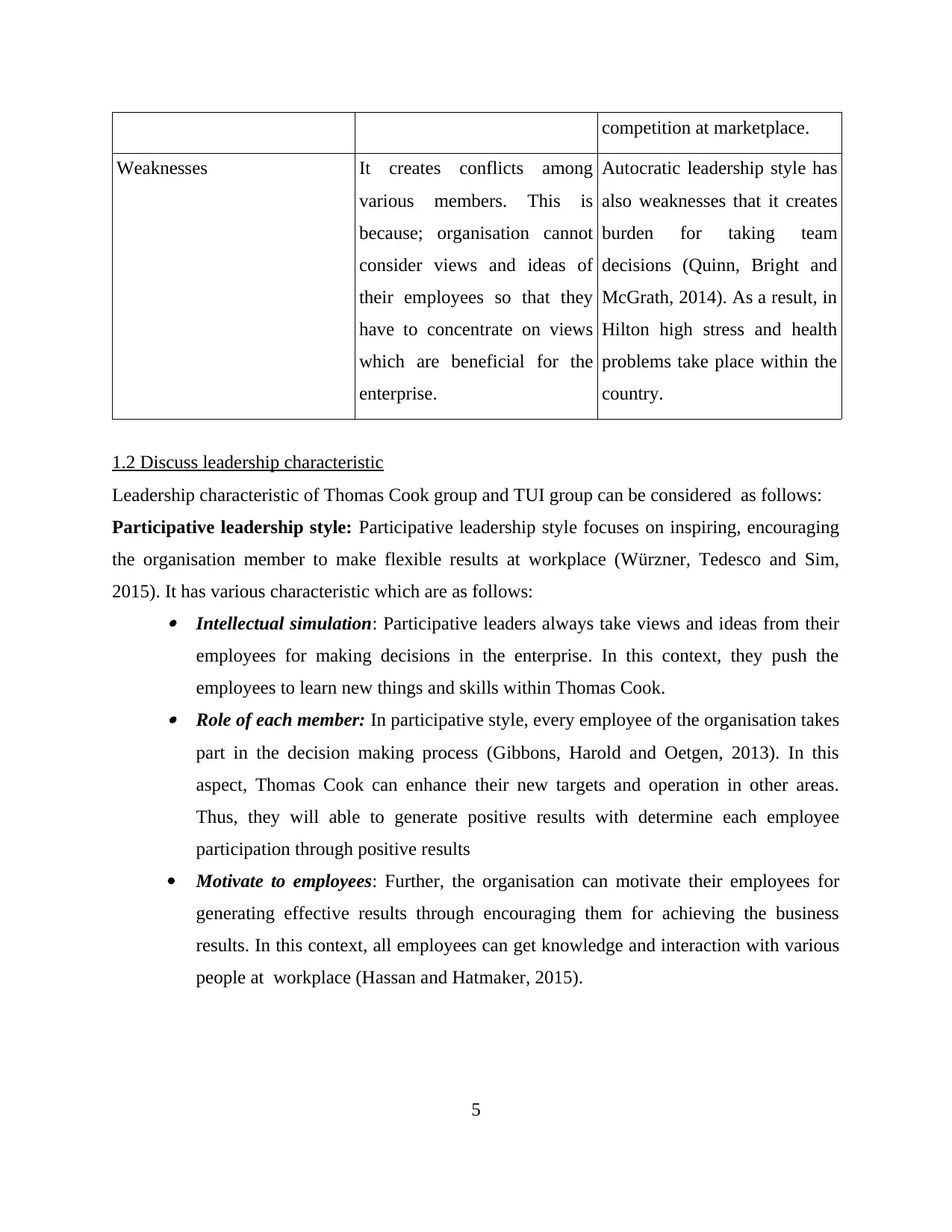
competition at marketplace.
Weaknesses It creates conflicts among
various members. This is
because; organisation cannot
consider views and ideas of
their employees so that they
have to concentrate on views
which are beneficial for the
enterprise.
Autocratic leadership style has
also weaknesses that it creates
burden for taking team
decisions (Quinn, Bright and
McGrath, 2014). As a result, in
Hilton high stress and health
problems take place within the
country.
1.2 Discuss leadership characteristic
Leadership characteristic of Thomas Cook group and TUI group can be considered as follows:
Participative leadership style: Participative leadership style focuses on inspiring, encouraging
the organisation member to make flexible results at workplace (Würzner, Tedesco and Sim,
2015). It has various characteristic which are as follows:
Intellectual simulation: Participative leaders always take views and ideas from their
employees for making decisions in the enterprise. In this context, they push the
employees to learn new things and skills within Thomas Cook.
Role of each member: In participative style, every employee of the organisation takes
part in the decision making process (Gibbons, Harold and Oetgen, 2013). In this
aspect, Thomas Cook can enhance their new targets and operation in other areas.
Thus, they will able to generate positive results with determine each employee
participation through positive results
Motivate to employees: Further, the organisation can motivate their employees for
generating effective results through encouraging them for achieving the business
results. In this context, all employees can get knowledge and interaction with various
people at workplace (Hassan and Hatmaker, 2015).
5
Weaknesses It creates conflicts among
various members. This is
because; organisation cannot
consider views and ideas of
their employees so that they
have to concentrate on views
which are beneficial for the
enterprise.
Autocratic leadership style has
also weaknesses that it creates
burden for taking team
decisions (Quinn, Bright and
McGrath, 2014). As a result, in
Hilton high stress and health
problems take place within the
country.
1.2 Discuss leadership characteristic
Leadership characteristic of Thomas Cook group and TUI group can be considered as follows:
Participative leadership style: Participative leadership style focuses on inspiring, encouraging
the organisation member to make flexible results at workplace (Würzner, Tedesco and Sim,
2015). It has various characteristic which are as follows:
Intellectual simulation: Participative leaders always take views and ideas from their
employees for making decisions in the enterprise. In this context, they push the
employees to learn new things and skills within Thomas Cook.
Role of each member: In participative style, every employee of the organisation takes
part in the decision making process (Gibbons, Harold and Oetgen, 2013). In this
aspect, Thomas Cook can enhance their new targets and operation in other areas.
Thus, they will able to generate positive results with determine each employee
participation through positive results
Motivate to employees: Further, the organisation can motivate their employees for
generating effective results through encouraging them for achieving the business
results. In this context, all employees can get knowledge and interaction with various
people at workplace (Hassan and Hatmaker, 2015).
5
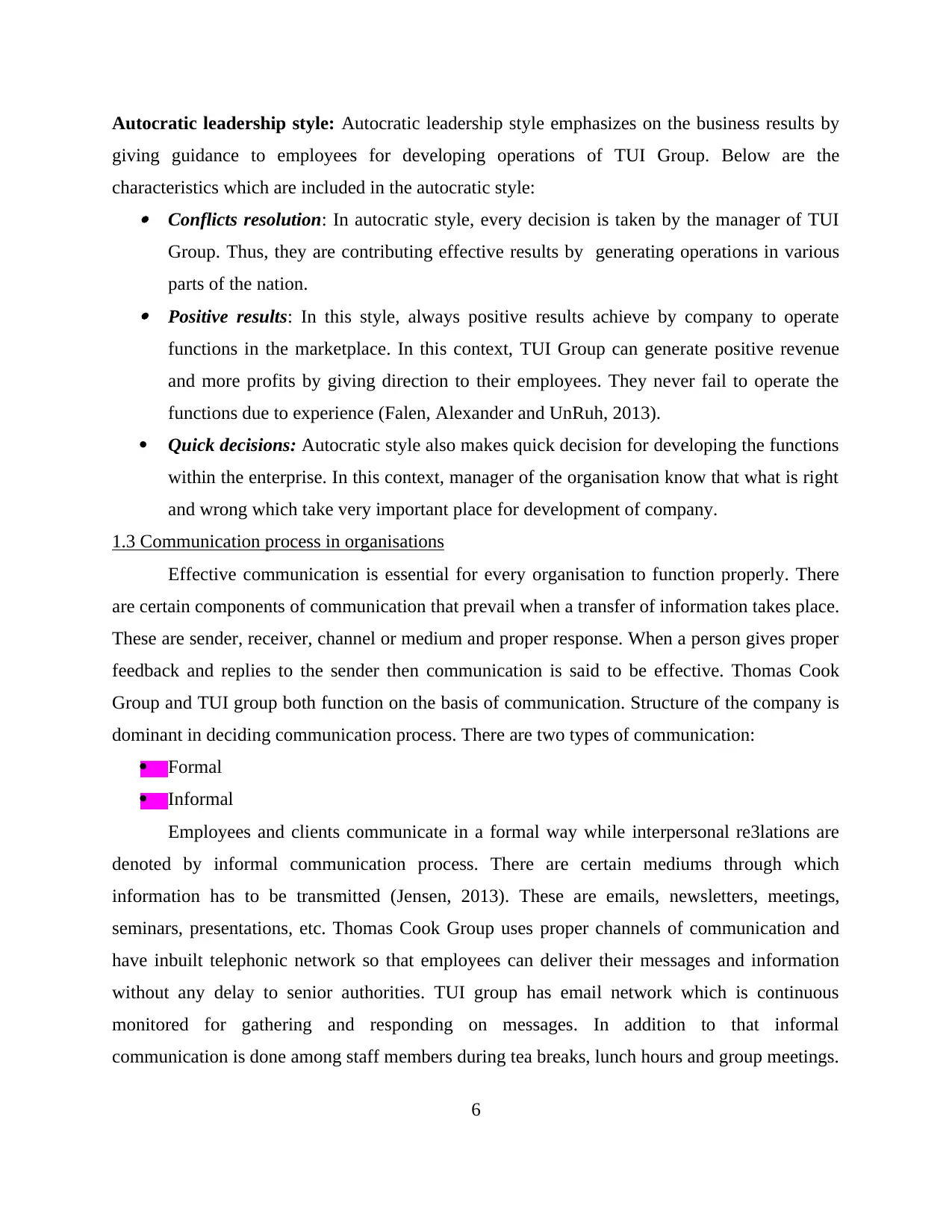
Autocratic leadership style: Autocratic leadership style emphasizes on the business results by
giving guidance to employees for developing operations of TUI Group. Below are the
characteristics which are included in the autocratic style: Conflicts resolution: In autocratic style, every decision is taken by the manager of TUI
Group. Thus, they are contributing effective results by generating operations in various
parts of the nation. Positive results: In this style, always positive results achieve by company to operate
functions in the marketplace. In this context, TUI Group can generate positive revenue
and more profits by giving direction to their employees. They never fail to operate the
functions due to experience (Falen, Alexander and UnRuh, 2013).
Quick decisions: Autocratic style also makes quick decision for developing the functions
within the enterprise. In this context, manager of the organisation know that what is right
and wrong which take very important place for development of company.
1.3 Communication process in organisations
Effective communication is essential for every organisation to function properly. There
are certain components of communication that prevail when a transfer of information takes place.
These are sender, receiver, channel or medium and proper response. When a person gives proper
feedback and replies to the sender then communication is said to be effective. Thomas Cook
Group and TUI group both function on the basis of communication. Structure of the company is
dominant in deciding communication process. There are two types of communication:
Formal
Informal
Employees and clients communicate in a formal way while interpersonal re3lations are
denoted by informal communication process. There are certain mediums through which
information has to be transmitted (Jensen, 2013). These are emails, newsletters, meetings,
seminars, presentations, etc. Thomas Cook Group uses proper channels of communication and
have inbuilt telephonic network so that employees can deliver their messages and information
without any delay to senior authorities. TUI group has email network which is continuous
monitored for gathering and responding on messages. In addition to that informal
communication is done among staff members during tea breaks, lunch hours and group meetings.
6
giving guidance to employees for developing operations of TUI Group. Below are the
characteristics which are included in the autocratic style: Conflicts resolution: In autocratic style, every decision is taken by the manager of TUI
Group. Thus, they are contributing effective results by generating operations in various
parts of the nation. Positive results: In this style, always positive results achieve by company to operate
functions in the marketplace. In this context, TUI Group can generate positive revenue
and more profits by giving direction to their employees. They never fail to operate the
functions due to experience (Falen, Alexander and UnRuh, 2013).
Quick decisions: Autocratic style also makes quick decision for developing the functions
within the enterprise. In this context, manager of the organisation know that what is right
and wrong which take very important place for development of company.
1.3 Communication process in organisations
Effective communication is essential for every organisation to function properly. There
are certain components of communication that prevail when a transfer of information takes place.
These are sender, receiver, channel or medium and proper response. When a person gives proper
feedback and replies to the sender then communication is said to be effective. Thomas Cook
Group and TUI group both function on the basis of communication. Structure of the company is
dominant in deciding communication process. There are two types of communication:
Formal
Informal
Employees and clients communicate in a formal way while interpersonal re3lations are
denoted by informal communication process. There are certain mediums through which
information has to be transmitted (Jensen, 2013). These are emails, newsletters, meetings,
seminars, presentations, etc. Thomas Cook Group uses proper channels of communication and
have inbuilt telephonic network so that employees can deliver their messages and information
without any delay to senior authorities. TUI group has email network which is continuous
monitored for gathering and responding on messages. In addition to that informal
communication is done among staff members during tea breaks, lunch hours and group meetings.
6
⊘ This is a preview!⊘
Do you want full access?
Subscribe today to unlock all pages.

Trusted by 1+ million students worldwide
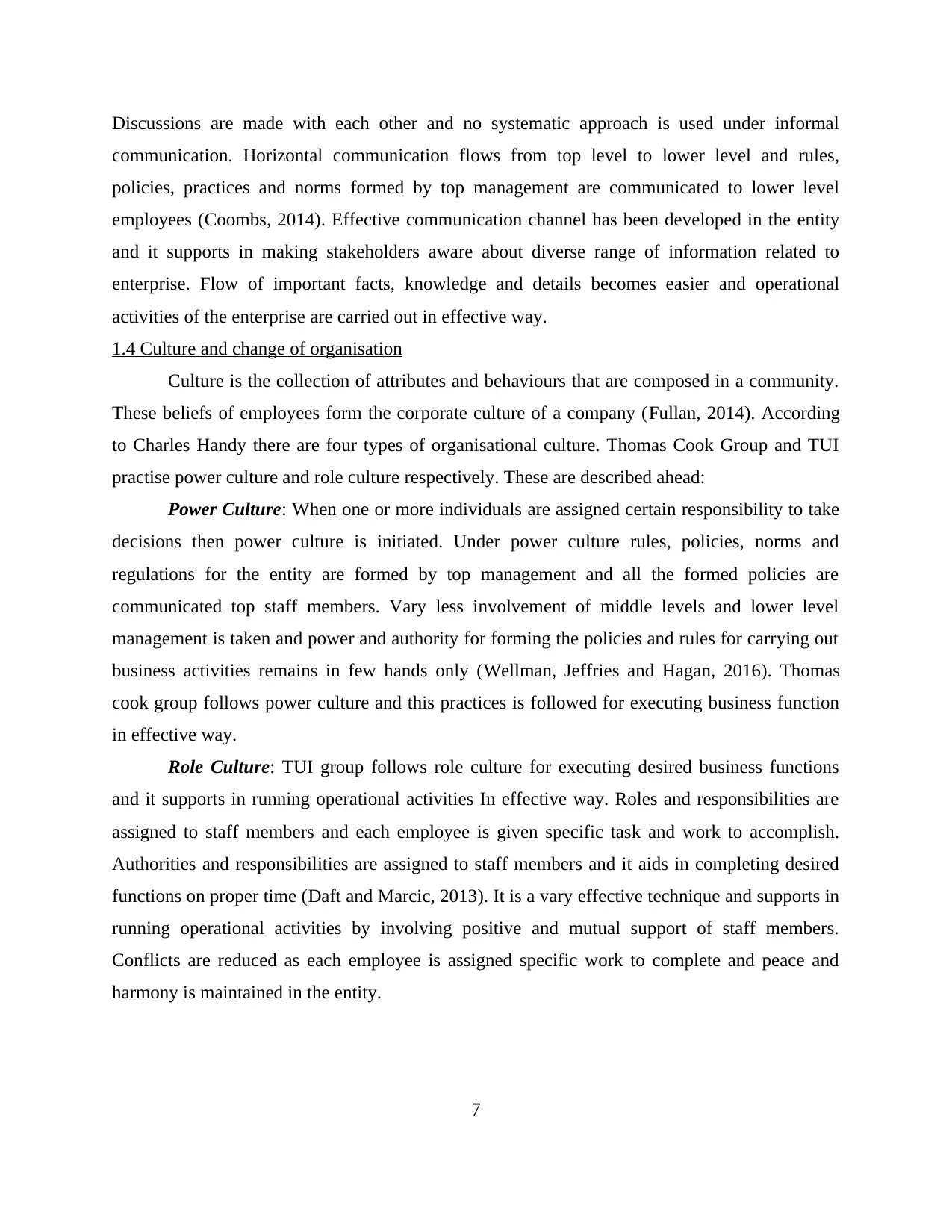
Discussions are made with each other and no systematic approach is used under informal
communication. Horizontal communication flows from top level to lower level and rules,
policies, practices and norms formed by top management are communicated to lower level
employees (Coombs, 2014). Effective communication channel has been developed in the entity
and it supports in making stakeholders aware about diverse range of information related to
enterprise. Flow of important facts, knowledge and details becomes easier and operational
activities of the enterprise are carried out in effective way.
1.4 Culture and change of organisation
Culture is the collection of attributes and behaviours that are composed in a community.
These beliefs of employees form the corporate culture of a company (Fullan, 2014). According
to Charles Handy there are four types of organisational culture. Thomas Cook Group and TUI
practise power culture and role culture respectively. These are described ahead:
Power Culture: When one or more individuals are assigned certain responsibility to take
decisions then power culture is initiated. Under power culture rules, policies, norms and
regulations for the entity are formed by top management and all the formed policies are
communicated top staff members. Vary less involvement of middle levels and lower level
management is taken and power and authority for forming the policies and rules for carrying out
business activities remains in few hands only (Wellman, Jeffries and Hagan, 2016). Thomas
cook group follows power culture and this practices is followed for executing business function
in effective way.
Role Culture: TUI group follows role culture for executing desired business functions
and it supports in running operational activities In effective way. Roles and responsibilities are
assigned to staff members and each employee is given specific task and work to accomplish.
Authorities and responsibilities are assigned to staff members and it aids in completing desired
functions on proper time (Daft and Marcic, 2013). It is a vary effective technique and supports in
running operational activities by involving positive and mutual support of staff members.
Conflicts are reduced as each employee is assigned specific work to complete and peace and
harmony is maintained in the entity.
7
communication. Horizontal communication flows from top level to lower level and rules,
policies, practices and norms formed by top management are communicated to lower level
employees (Coombs, 2014). Effective communication channel has been developed in the entity
and it supports in making stakeholders aware about diverse range of information related to
enterprise. Flow of important facts, knowledge and details becomes easier and operational
activities of the enterprise are carried out in effective way.
1.4 Culture and change of organisation
Culture is the collection of attributes and behaviours that are composed in a community.
These beliefs of employees form the corporate culture of a company (Fullan, 2014). According
to Charles Handy there are four types of organisational culture. Thomas Cook Group and TUI
practise power culture and role culture respectively. These are described ahead:
Power Culture: When one or more individuals are assigned certain responsibility to take
decisions then power culture is initiated. Under power culture rules, policies, norms and
regulations for the entity are formed by top management and all the formed policies are
communicated top staff members. Vary less involvement of middle levels and lower level
management is taken and power and authority for forming the policies and rules for carrying out
business activities remains in few hands only (Wellman, Jeffries and Hagan, 2016). Thomas
cook group follows power culture and this practices is followed for executing business function
in effective way.
Role Culture: TUI group follows role culture for executing desired business functions
and it supports in running operational activities In effective way. Roles and responsibilities are
assigned to staff members and each employee is given specific task and work to accomplish.
Authorities and responsibilities are assigned to staff members and it aids in completing desired
functions on proper time (Daft and Marcic, 2013). It is a vary effective technique and supports in
running operational activities by involving positive and mutual support of staff members.
Conflicts are reduced as each employee is assigned specific work to complete and peace and
harmony is maintained in the entity.
7
Paraphrase This Document
Need a fresh take? Get an instant paraphrase of this document with our AI Paraphraser
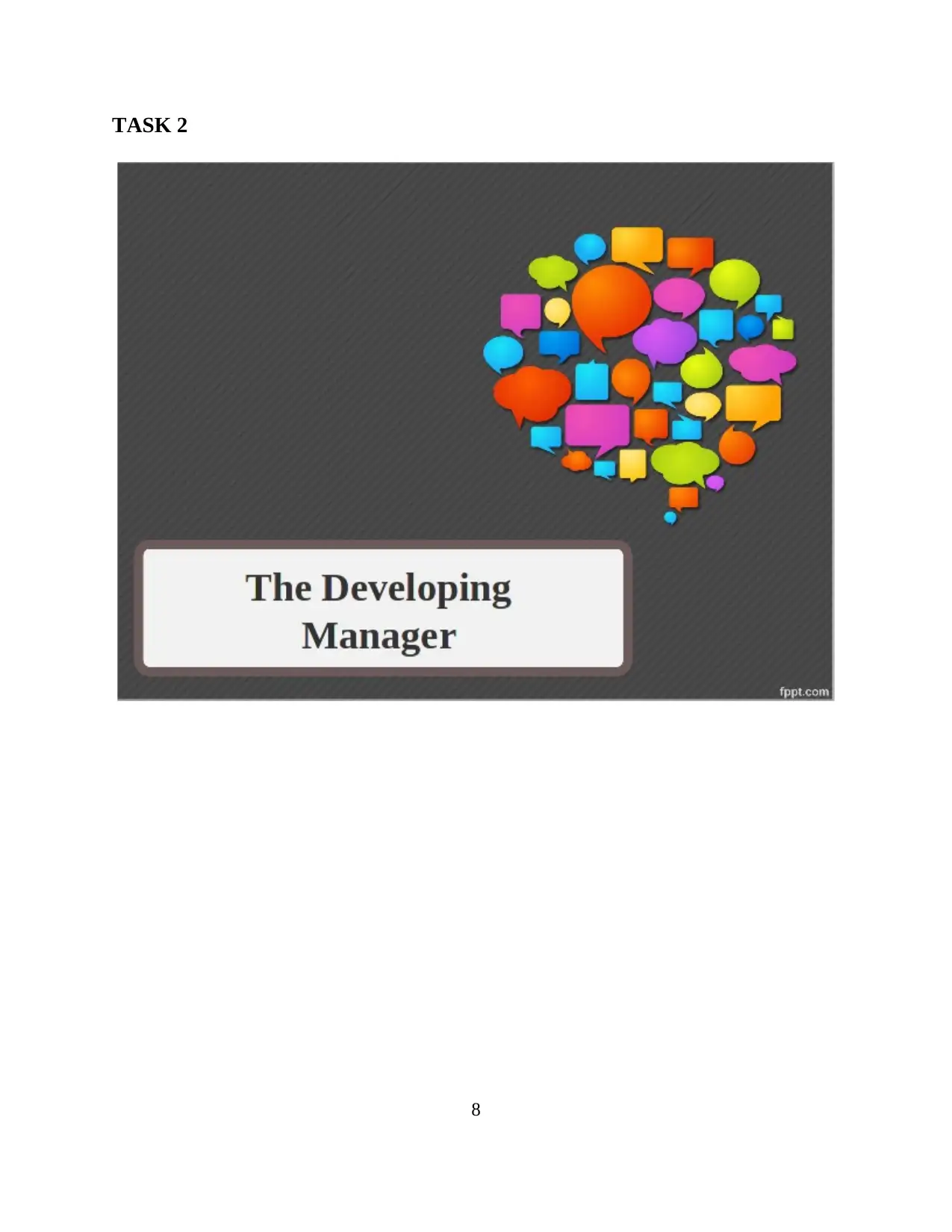
TASK 2
8
8
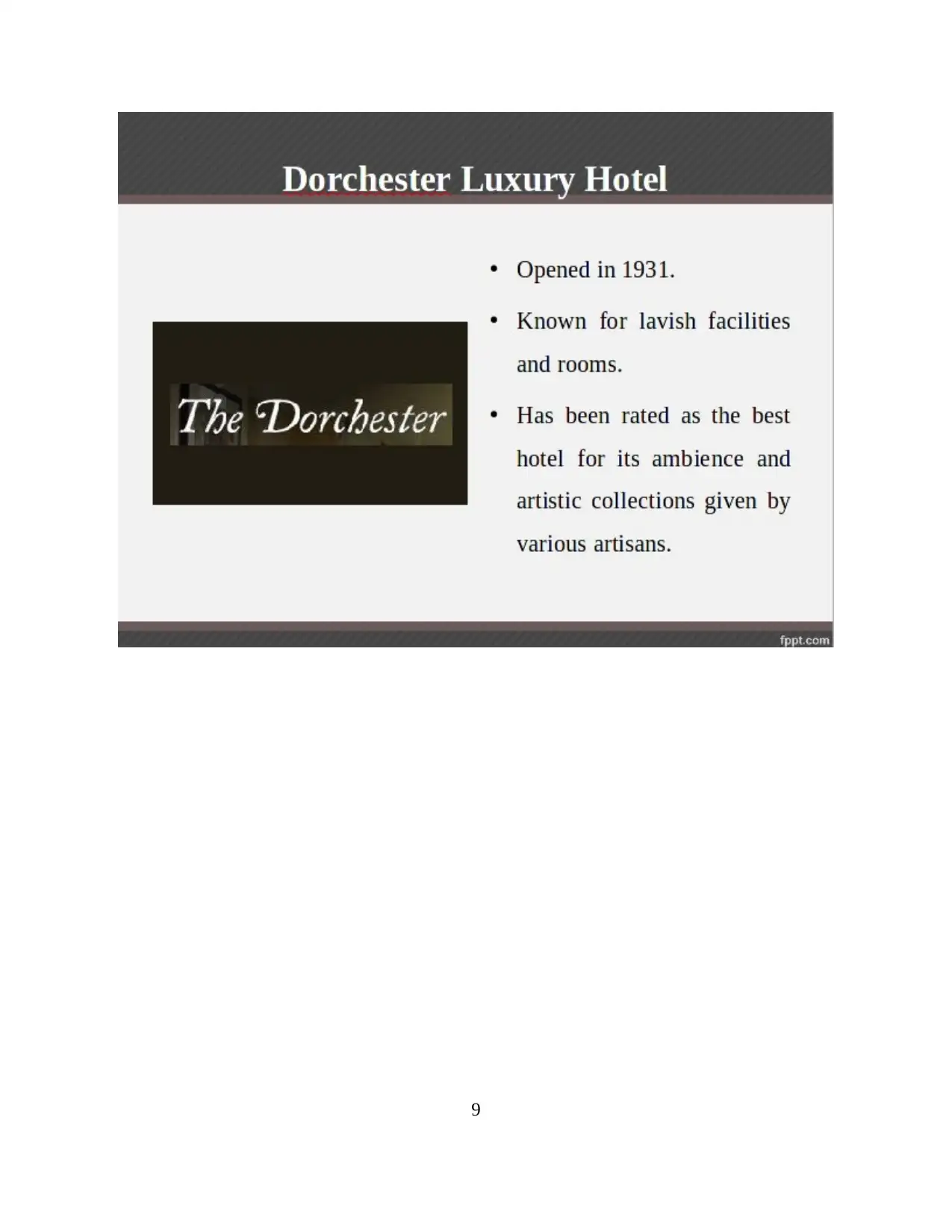
9
⊘ This is a preview!⊘
Do you want full access?
Subscribe today to unlock all pages.

Trusted by 1+ million students worldwide
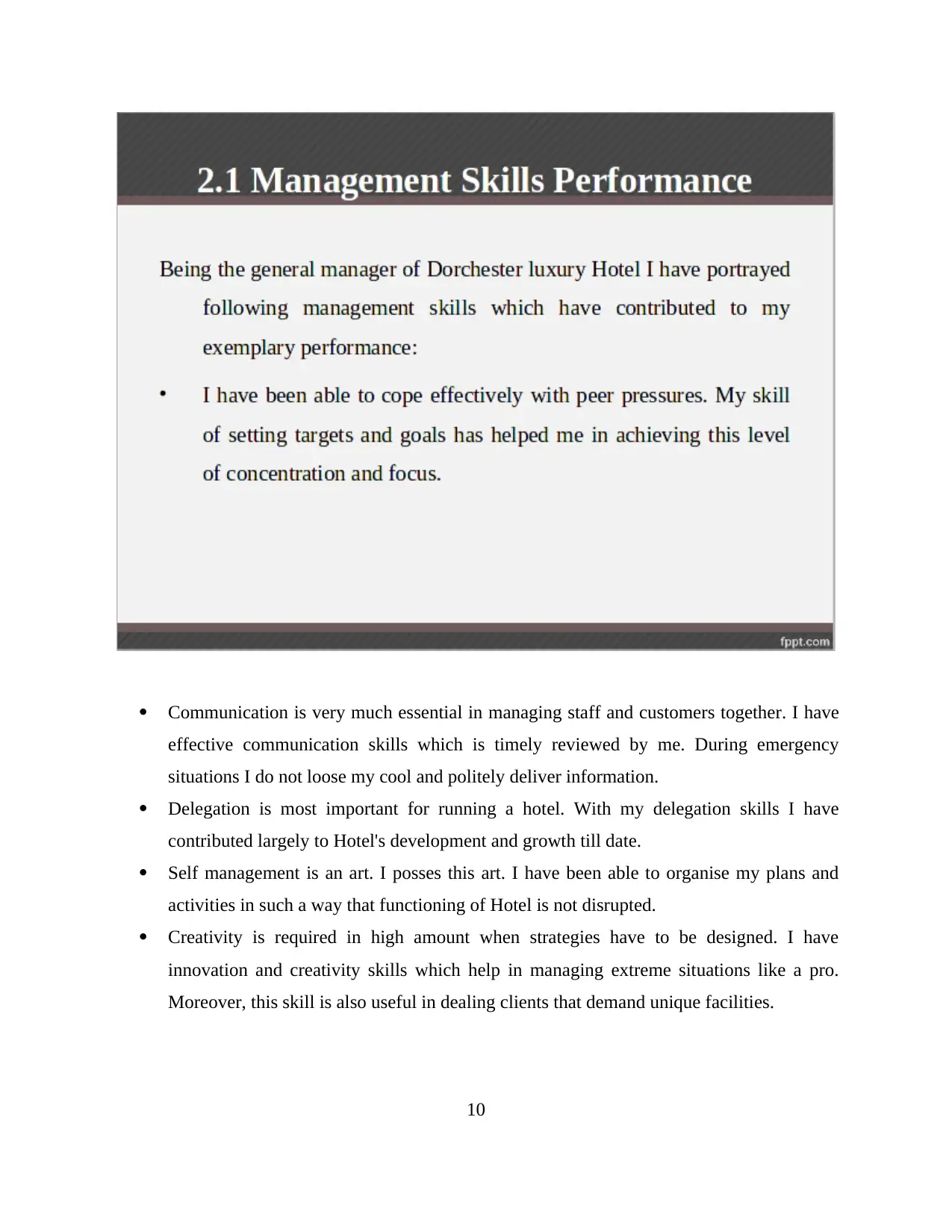
Communication is very much essential in managing staff and customers together. I have
effective communication skills which is timely reviewed by me. During emergency
situations I do not loose my cool and politely deliver information.
Delegation is most important for running a hotel. With my delegation skills I have
contributed largely to Hotel's development and growth till date.
Self management is an art. I posses this art. I have been able to organise my plans and
activities in such a way that functioning of Hotel is not disrupted.
Creativity is required in high amount when strategies have to be designed. I have
innovation and creativity skills which help in managing extreme situations like a pro.
Moreover, this skill is also useful in dealing clients that demand unique facilities.
10
effective communication skills which is timely reviewed by me. During emergency
situations I do not loose my cool and politely deliver information.
Delegation is most important for running a hotel. With my delegation skills I have
contributed largely to Hotel's development and growth till date.
Self management is an art. I posses this art. I have been able to organise my plans and
activities in such a way that functioning of Hotel is not disrupted.
Creativity is required in high amount when strategies have to be designed. I have
innovation and creativity skills which help in managing extreme situations like a pro.
Moreover, this skill is also useful in dealing clients that demand unique facilities.
10
Paraphrase This Document
Need a fresh take? Get an instant paraphrase of this document with our AI Paraphraser
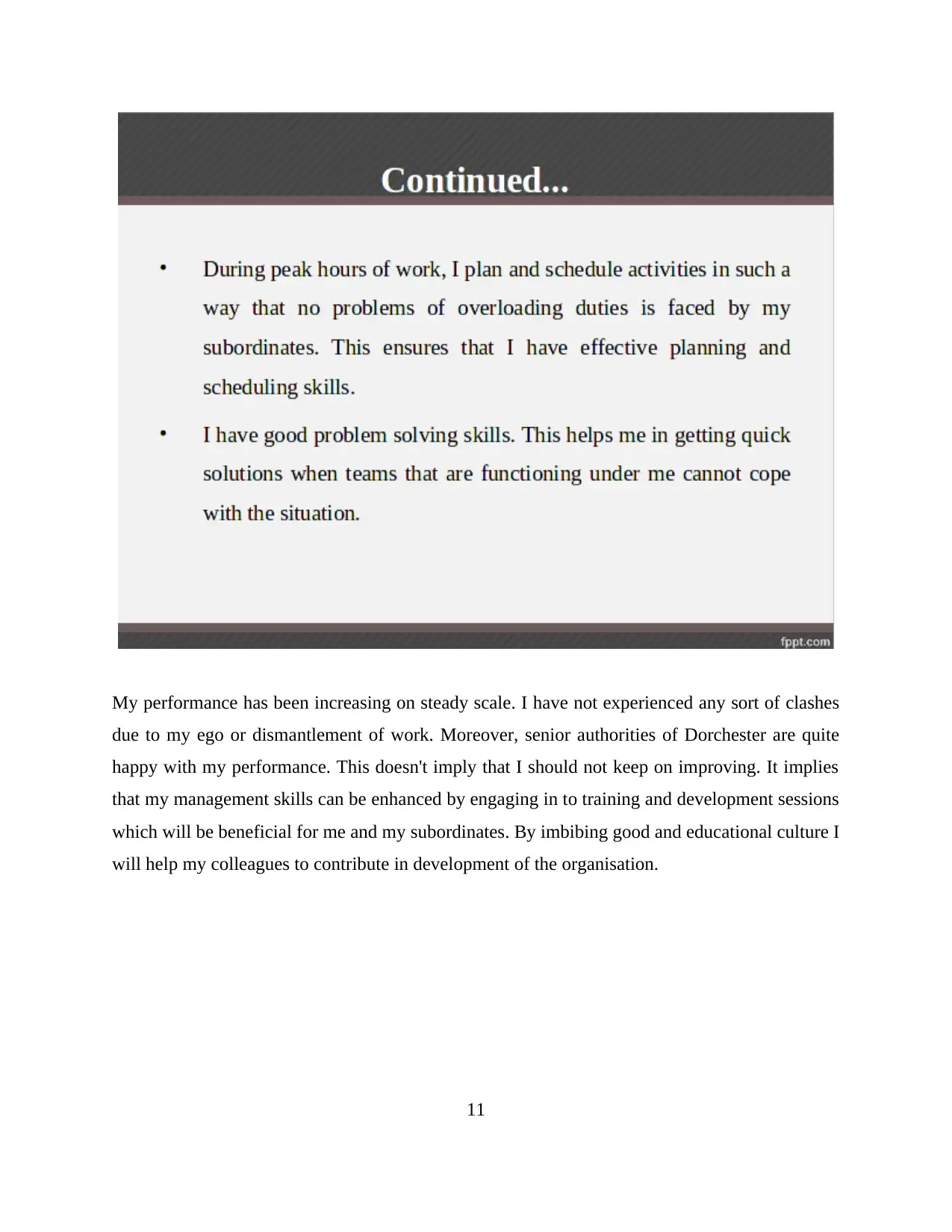
My performance has been increasing on steady scale. I have not experienced any sort of clashes
due to my ego or dismantlement of work. Moreover, senior authorities of Dorchester are quite
happy with my performance. This doesn't imply that I should not keep on improving. It implies
that my management skills can be enhanced by engaging in to training and development sessions
which will be beneficial for me and my subordinates. By imbibing good and educational culture I
will help my colleagues to contribute in development of the organisation.
11
due to my ego or dismantlement of work. Moreover, senior authorities of Dorchester are quite
happy with my performance. This doesn't imply that I should not keep on improving. It implies
that my management skills can be enhanced by engaging in to training and development sessions
which will be beneficial for me and my subordinates. By imbibing good and educational culture I
will help my colleagues to contribute in development of the organisation.
11
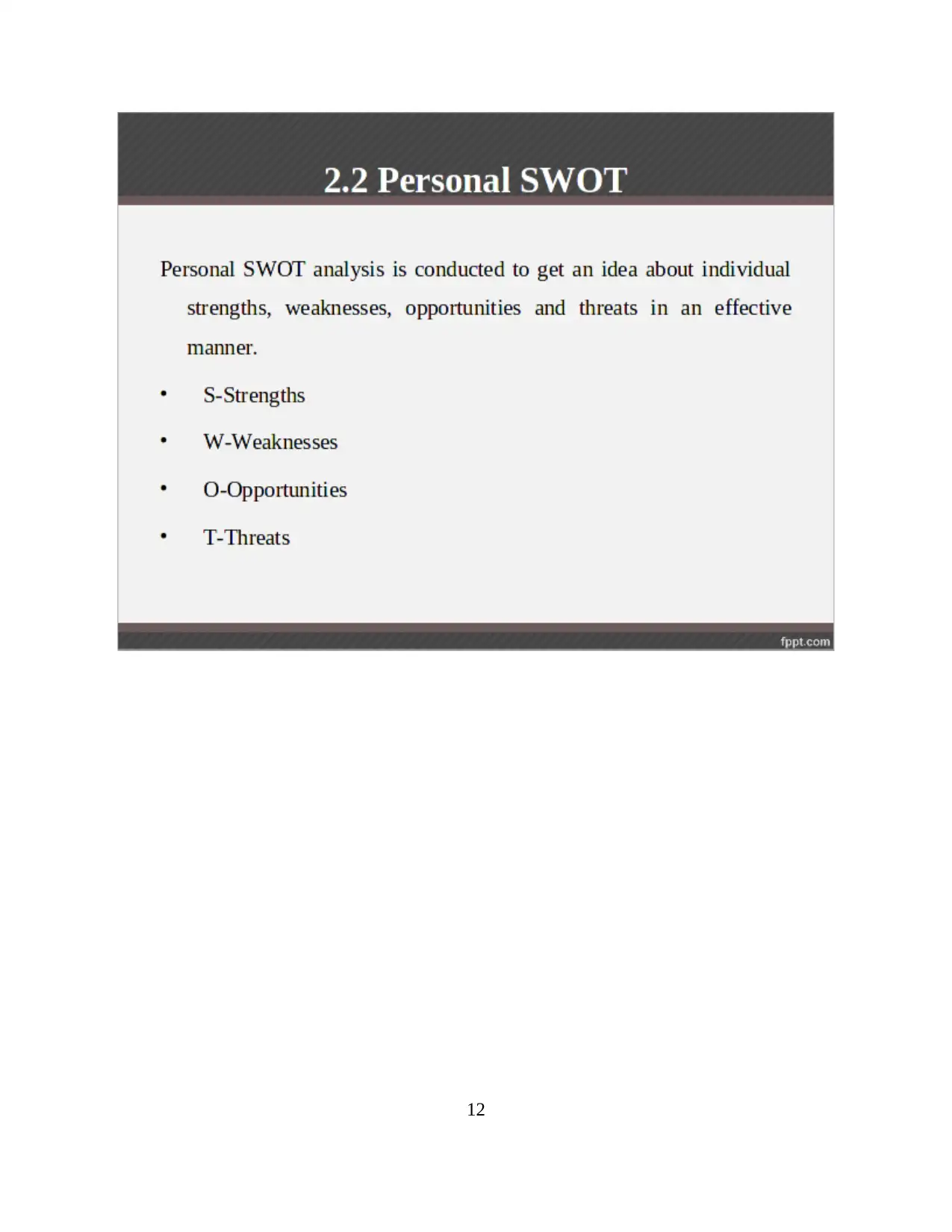
12
⊘ This is a preview!⊘
Do you want full access?
Subscribe today to unlock all pages.

Trusted by 1+ million students worldwide
1 out of 28
Related Documents
Your All-in-One AI-Powered Toolkit for Academic Success.
+13062052269
info@desklib.com
Available 24*7 on WhatsApp / Email
![[object Object]](/_next/static/media/star-bottom.7253800d.svg)
Unlock your academic potential
Copyright © 2020–2025 A2Z Services. All Rights Reserved. Developed and managed by ZUCOL.





